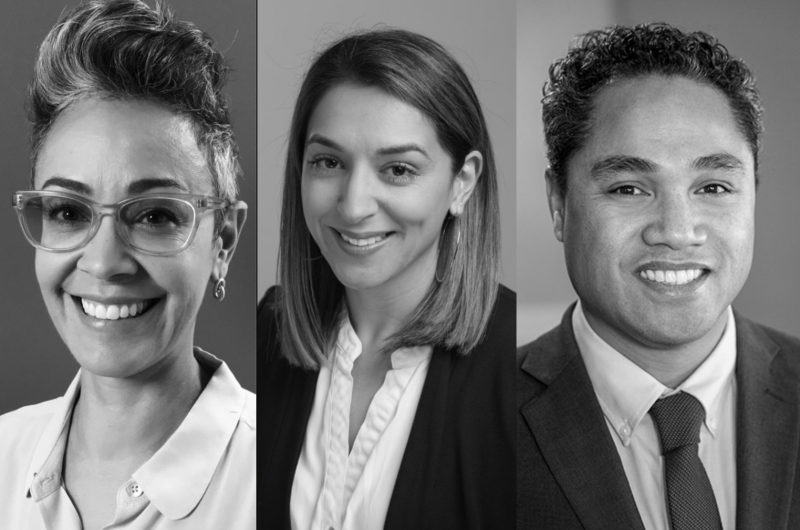
The campaign to recall three members of the San Francisco Board of Education has submitted enough valid signatures to put the questions before voters next year, in a referendum on the district’s handling of the coronavirus pandemic and its stewardship of the city’s schools.
San Francisco’s Department of Elections announced Monday that recalls against Alison Collins, Gabriela López and Faauuga Moliga will appear as three separate questions on a Feb. 15 special election ballot, after organizers submitted far more than the 51,325 signatures per member required to force a vote.
The vote will be the first ballot recall of a San Francisco official in nearly 40 years, since then-Mayor Dianne Feinstein defeated a recall with 81% of the vote.
“It’s a huge relief to know that we’re on the ballot and we’re going to be finishing this journey a year and a day after we started it,” said Autumn Looijen, co-chair of the recall campaign.
Looijen and Siva Raj launched the recall effort in February 2021, as San Francisco school board members faced escalating pressure from some parents to resume in-person learning.
Critics of the board argued that members had prioritized initiatives to rename certain schools and revamp the admissions process at Lowell High School over what they considered to be the far more pressing issue of reopening classrooms.
But Looijen said the recall is not just a punishment for past decisions, but a way to ensure sound management of a district that currently faces a $116 million budget deficit for the 2022-2023 school year.
“For us, it’s not a question of consequences, it’s a question of competence — whether they have the skills necessary to deal with the budget crisis,” Looijen said. “They’ve shown no propensity for having deep, nuanced conversations about the problem, and we need someone who will listen to the whole community when they’re making big cuts.”
If any of the three board members is recalled, San Francisco Mayor London Breed would appoint their replacement. The other four members of the board were elected last November, and therefore are not eligible to be recalled based on city elections rules.
It remains to be seen whether the three board members unify for a joint campaign against the recall. All three have argued that their caution in reopening classrooms reflected serious health concerns among some parents and teachers over a return to in-person learning during the pandemic.
But after a series of tweets from Collins surfaced earlier this year, using derogatory language in reference to Asian Americans, Moliga voiced support for stripping Collins of her committee assignments and role as board vice president. In response, Collins unsuccessfully sued the district for nearly $90 million in damages.
Collins and López did not respond to request for comment, while Moliga referred questions to activist Gaynorann Siataga.
“Right now we feel as a community very insulted and very disrespected,” said Siataga, who identifies as a Pacific Islander of mixed descent. “Not just because Moliga is a Pacific Islander, but he’s a great representative and he’s done a lot of amazing work.”
Siataga urged voters to “look at everyone individually,” adding, “I don’t feel that Commissioner Moliga should have been grouped up in this recall.”
The politically imperiled board members likely will find support from the union representing San Francisco Unified School District employees. Cassondra Curiel, president of the United Educators of San Francisco, said the removal of the board members will give the mayor power over the school board at the expense of parent and teacher voices.
“As educators who love our communities and care for our students, we are urging voters to reject this recall,” Curiel said. “The recall will waste precious resources when decision-makers need to be laser-focused on meeting the needs of our students.”
COVID-19 closures and restrictions have served as flashpoints for school politics beyond San Francisco, said Joshua Spivak, senior fellow at the Hugh L. Carey Institute for Government Reform at Wagner College.
“There have been an enormous amount of recall attempts against school board members, but very, very few have gotten to the ballot this year,” said Spivak, an expert in recalls.
Spivak called the San Francisco school board recall the most noteworthy attempt to remove school officials since 1959, when voters in Little Rock, Arkansas, recalled three segregationist school board members — ending a standoff over the integration of the city’s high schools.
“What makes this interesting is just how many signatures were needed,” Spivak said of the San Francisco campaign. “It’s an enormous amount of signatures for any local office.”
City law requires recall proponents to gather signatures equal to 10% of the city’s registered voters. By comparison, the failed campaign to recall Gov. Gavin Newsom qualified by meeting a threshold based on the votes cast in the previous gubernatorial election.
In addition to the three recall questions, the February ballot will also include a vote on the city’s next assessor-recorder, and could potentially include a state Assembly primary contest for voters on the city’s east side.
[“source=kqed”]
